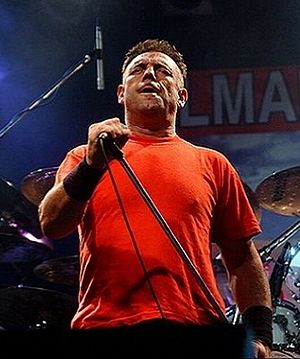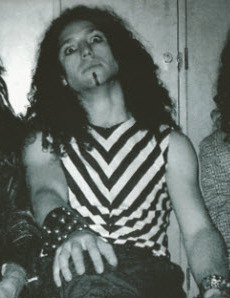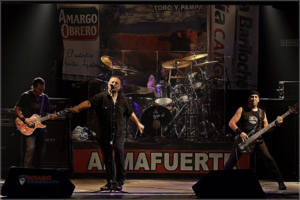Ricardo Iorio facts for kids
Quick facts for kids
Ricardo Iorio
|
|
|---|---|

Iorio in 2011
|
|
| Background information | |
| Birth name | Ricardo Horacio Iorio |
| Born | 25 June 1962 Ciudadela, Buenos Aires, Argentina |
| Died | 24 October 2023 (aged 61) Coronel Suárez, Argentina |
| Genres | Heavy metal |
| Occupation(s) |
|
| Instruments |
|
Ricardo Iorio (25 June 1962 – 24 October 2023) was an Argentine heavy metal singer and bassist.
Iorio was one of the founders of V8 (1979–1987) and later founded the band Hermética (1988–1994). He was the singer and main composer of Almafuerte from 1995 until his death. His songs were urban stories dealing with the life of the lower classes, as well as Argentine 'metalheads'. Even though he played bass with every band he integrated, he had recently chosen Beto Ceriotti to be the new bassist of Almafuerte, remaining as the singer and main composer of the band (mostly lyrics).
Extremely nationalist, Iorio continuously proclaimed in his songs and in the media the pride in being Argentine and Argentine history, and mixed native music styles like tango, Indian and gaucho culture with the heavy metal base of Almafuerte.
Contents
Biography
V8
Ricardo Iorio and Ricardo "el Chofa" Moreno met at age 16, in July 1978 during a screening of the film "The Song Remains the Same" by Led Zeppelin. They became friends and formed a cover band with Carlos Aragone and Sandro Castaña. They started playing Black Sabbath songs, but soon began composing their first songs, based on people from the neighbourhood. Castaña left the group and they tried with other drummers such as Carlos Ramos, who in turn invited the guitarist Osvaldo Civile to try to join the band but he was not accepted. They played with Pichi Correa three more times, now under the name "Comunión humana".
Finally, the two Ricardos left that group, but given their friendship stayed together and formed another one. They wrote their first songs at Moreno's house, such as "Voy a enloquecer", "Muy Cansado Estoy", "Si Puedes Vencer Al Temor", "Maligno", etc. They contacted drummer Gerardo Osemberg, and soon formed a new group. Iorio moved to bass and vocals, and el Chofa to the guitar. Following the suggestion of a friend, they decided to name the group V8, as a reference to the V8 engine.
After some concerts with support from other groups, Osemberg left and was replaced by Alejandro Colantonio. They later met the group WC, their singer Alberto Zamarbide left it and joined V8 as a result of a fight with his guitarist. El Chofa left the band for health reasons, and proposed Osvaldo Civile as a replacement, who was accepted by Iorio despite their musical differences. Finally, Colantonio emigrated to Spain and was replaced by Gustavo Rowek.
They recorded a demo, and later Zamarbide met Pappo, a famous rock guitarist at the time. With his help they could take part in the B.A.Rock festival. The group shocked most of the hippies of the public with his violent music, and it became known among metalheads.
The Umbral label recorded their first album in 1983, "Luchando por el metal", with a guest appearance by Pappo. The concerts continued, although on several occasions the group was scammed by its representatives. The recording of the second album, "Un paso más en la batalla", took 300 hours at the study and two months of real-time.
Rowek and Zamarbide travelled to Brazil to attend the festival Rock in Rio. They considered that the situation in that country for a heavy metal band would be more advantageous than in Argentina, so the group travelled to try to settle in that country. However, the situation was more complicated than expected, so Zamarbide and Iorio returned to Argentina alone, leaving Rowek and Civile in Brazil.
To start again with the group, they took the drummer Gustavo Andino and guitarists Walter Giardino and Miguel Roldán. But the first two did not last long and were quickly removed from the band. Giardino had discussions with Iorio about the band's musical direction and even composed songs that were rejected. Giardino would use those songs in his next group, Rata Blanca. Andino was replaced by Adrián Cenci, 16, who had already recorded an album with a Hard Metal band, playing double bass since 79, and the few that existed in the year 85, a true prodigy. Giardino was not replaced, and the band returned to a single guitarist, Roldan.
The band got into a religious conflict between its members when Iorio got interested in Spiritualism and the others in Evangelism. This caused heated arguments between them. The song "Voy a enloquecer" (Spanish: "I'm going mad"), written by Iorio and the late Moreno in the early days of the band, was recorded in the 3rd LP but under the name "No enloqueceré" (Spanish: "I shall not go mad") and with altered lyrics. Mundi Epifanio made an offer for the band to play in Mexico, which ultimately led to the separation of the band.
Hermética
After the breakup of V8, Iorio did a couple of rehearsals with Martin Kyne from Kamikaze, but got nowhere. Finally, he formed the group with vocalist Claudio O'Connor, drummer Fabián Spataro and guitarist Antonio Romano. The name of the band is a reference to hermeticism; Iorio saw similarities between the hermetic doctrine and the context of the Argentine heavy metal. Their first show was in Centro Cultural Recoleta. Shortly after that show, Fabián Spataro left the band and was replaced by Tony Scotto. In 1989 they recorded their self-titled debut album, Hermética, through the new label Radio Tripoli. It was the first thrash metal long play recorded in Argentina. It was also the first album in which Ricardo Iorio recorded lead vocals on a track ("Desde el oeste").
The band got a proposal to record an EP with just 27 hours of recording time. They accepted and recorded a rushed cover album, Intérpretes. The following full album, Ácido argentino, was certified gold, and the band played for Motorhead and Black Sabbath (with Ronnie James Dio) during their respective concerts in the country.
The band's popularity grew from its inception, despite not having songs on radio or any really important broadcasting. In 1993 they recorded the live album "En Vivo 1993 Argentina" at Stadium, and in 1994 they took part in the festival Monsters of Rock at the Estadio Monumental alongside Slayer, Kiss and Black Sabbath (with Tony Martin). In the presentation of their third album, "Víctimas del vaciamiento" (which was also certified Gold) they filled the Estadio Obras Sanitarias and recorded a live album.
However, the band unexpectedly broke up at the end of 1994. Iorio argued that relations with the other band members had deteriorated, while others declared exhaustion from not being consulted on the organizational aspects of the band.
Almafuerte
After the disbanding of Hermética Iorio formed the band Almafuerte with Claudio Cardacci and Claudio Marciello. Iorio began to sing their songs as a regular frontman. His former colleagues formed Malón, with whom Iorio began a fierce rivalry. Iorio wrote a song attacking them, "Buitres" ("Vultures"), while they gave him "La Fábula del avestruz y el jabalí" ("The Fable of the Ostrich and the Wild Boar").
Their first album, "Mundo Guanaco" was released before Malón's first, and had several covers. "Desencuentro" by Cátulo Castillo, a tango transformed into Heavy Metal, "De los pagos del tiempo" by José Larralde (presented by Hermética at the Obras Sanitarias Stadium), and V8's "Voy a enloquecer" with the original name and lyrics. Iorio also filmed the first video clip of his career, for the song "El Pibe Tigre".
The following year Flavio Cianciarulo from Los Fabulosos Cadillacs produced their second album, "Del Entorno". This time folk songs were not included, as Iorio intended such compositions for a solo album with Flavio that would appear the next year: "Peso Argento".
The bands with former members of V8, Horcas, Logos and Rata Blanca, played together in the Metal Rock Festival, which ended with a reunion of the band. The bass was played by Miguel Roldán, who was part of V8 but as a guitarist. Almafuerte had been invited to participate but Iorio refused, considering that his current band was better.
In 1998 Malón disbanded and Iorio referred to that in the song "Triunfo" from the self-titled new album. The album also has a song about Pedro Bonifacio Palacios, explaining the reasons for Iorio to use his sobriquet "Almafuerte" as the name of his band.
In 1999 they provided a theme for the soundtrack of the film "El visitante", which was included in the album "A Fondo Blanco". The album also included Iorio's first forays into actual Tango music (excluding "Cambalache" and "Desencuentro", where tangos were reformulated as Heavy Metal songs), which were designed for a possible second album with Flavio but no decision could be made by Polygram.
Iorio left Buenos Aires city to live in the countryside with his daughter Sofía and his girlfriend Fernanda. Iorio's wife, Ana Mourin, died in 2001. Iorio also participated in several projects outside metal music, such as with folk musician León Gieco, Rubén Patagonia, Augusto Romero and Los Fabulosos Cadillacs's bassist Flavio Cianciarulo (they recorded an entire album called Peso Argento). He also had a great friendship with the late Argentinian guitar player Norberto Napolitano, also known as Pappo, who invited Iorio to record some songs for his Pappo y Amigos album.
Death
Ricardo Iorio died on 24 October 2023, at the age of 61. He felt pain in the chest and called for an ambulance, but died on the way. When he arrived to the hospital, he was declared dead. He had no previous known health problems.
Discography
| Album | Band/Project | Year | Recording |
|---|---|---|---|
| Demo | V8 | 1982 | EP |
| Luchando Por El Metal | V8 | 1983 | Studio |
| Un Paso Mas En La Batalla | V8 | 1985 | Studio |
| El Fin De Los Inicuos | V8 | 1986 | Studio |
| Hermética | Hermética | 1989 | Studio |
| Intérpretes | Hermética | 1990 | EP (Covers) |
| No Se Rindan | V8 | 1991 | Compilation |
| Acido Argentino | Hermética | 1991 | Studio |
| En Vivo 1993 Argentina | Hermética | 1993 | Live |
| Victimas del Vaciamiento | Hermética | 1994 | Studio |
| Lo Ultimo | Hermética | 1995 | Live |
| En Concierto I & II | Hermética | 1995 | Live |
| Mundo Guanaco | Almafuerte | 1995 | Studio |
| Del Entorno | Almafuerte | 1996 | Studio |
| Peso Argento | Iorio & Flavio | 1997 | Studio |
| En Vida | Almafuerte | 1997 | Live |
| Almafuerte | Almafuerte | 1998 | Studio |
| Sentimiento Argentino | Hermética | 1998 | Compilation |
| Profeta en su tierra | Almafuerte | 1998 | Compilation |
| A fondo blanco | Almafuerte | 1999 | Studio |
| Piedra libre | Almafuerte | 2001 | Studio |
| En vivo, Obras 2001 | Almafuerte | 2001 | Live |
| Antología | V8 | 2002 | Compilation |
| Ultimando | Almafuerte | 2003 | Studio |
| 10 años | Almafuerte | 2005 | Live |
| Toro y Pampa | Almafuerte | 2006 | Studio |
| Ayer Deseo, Hoy Realidad | Ricardo Iorio | 2008 | Studio (Covers) |
| En Vivo, Obras 2008, | Almafuerte | 2009 | Live + DVD |
| Trillando la Fina | Almafuerte | 2012 | Studio |
| En Vivo Microestadio Malvinas Argentinas | Almafuerte | 2013 | Live + DVD |
| Tangos y Milongas | Ricardo Iorio | 2014 | Studio (Covers) |
| Atesorando en los Cielos | Ricardo Iorio | 2015 | Studio (Covers) |
See also
 In Spanish: Ricardo Iorio para niños
In Spanish: Ricardo Iorio para niños



